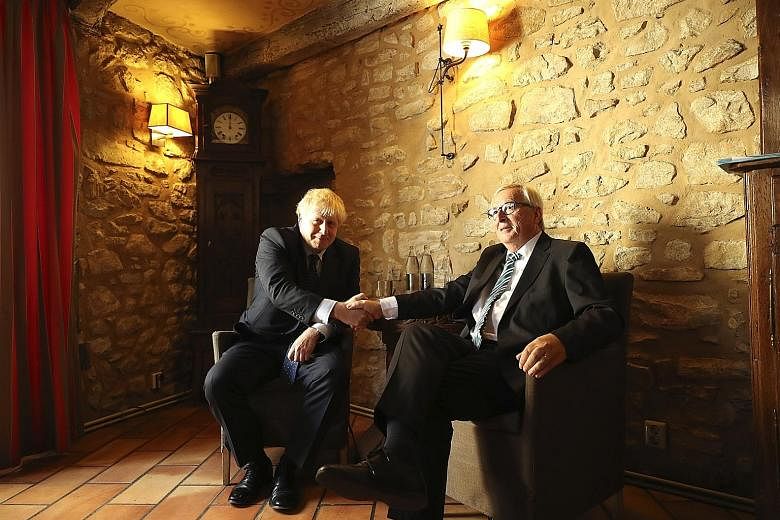LONDON • British Prime Minister Boris Johnson and European Commission president Jean-Claude Juncker agreed yesterday to ramp up talks on securing an elusive Brexit deal, but the two sides gave starkly different assessments of how far apart they are.
The two men held their first face-to-face talks over a two-hour lunch in Mr Juncker's native Luxembourg amid claims from the UK - though not from the European Union - that an agreement is in sight.
Mr Johnson's Downing Street office said "the leaders agreed that the discussions needed to intensify and that meetings would soon take place on a daily basis", with EU chief negotiator Michel Barnier and UK Brexit Secretary Steve Barclay getting involved in the talks. Downing Street also called yesterday's meeting "constructive".
The European Commission, however, said Britain had yet to offer any "legally operational" solutions to the problem of keeping goods and people flowing freely across the Irish border, the main roadblock to a deal.
It said that Mr Juncker underlined the commission's continued "willingness and openness to examine whether such proposals meet the objectives of the backstop" - the Irish border provision rejected by British lawmakers.
"Such proposals have not yet been made," the European Commission said, adding that officials "will remain available to work 24/7".
Mr Johnson has repeatedly said the UK will leave the EU on the scheduled date of Oct 31 with or without a Brexit divorce deal. But he also insists he can strike a revised agreement with the bloc in time for an orderly departure. The agreement made by his predecessor, Mrs Theresa May, was rejected three times by Britain's Parliament, prompting her to resign.
Mr Johnson said in a Daily Telegraph column yesterday that he believes "passionately" that a deal can be agreed and approved at a summit of EU leaders on Oct 17 to 18.
He said the government was working "flat out" to achieve it - and accused his opponents in Parliament of trying to "crush Brexit".
"If we can make enough progress in the next few days, I intend to go to that crucial summit on Oct 17, and finalise an agreement that will protect the interests of business and citizens on both sides of the Channel, and on both sides of the border in Ireland," Mr Johnson wrote.
While the EU says it is still waiting for firm proposals from the UK, Mr Johnson's spokesman James Slack said Britain had "put forward workable solutions in a number of areas". He declined to elaborate, saying it was unhelpful to negotiate in public.
After the meeting yesterday over a lunch of pollock and mushroom-pea risotto, Mr Juncker simply called the encounter "friendly".
Talks remain stalled on the contentious issue of the Irish backstop, an insurance policy in Mrs May's agreement intended to ensure there are no checks on goods crossing the UK's land border with the Republic of Ireland.
Brexit supporters oppose the backstop because it keeps the UK bound to EU trade rules, limiting its ability to forge new free trade deals around the world after Brexit.
Britain has suggested "alternative arrangements" to the backstop - a mix of technology to replace border checks and a common area for agricultural products and animals covering the whole island of Ireland - but the EU says it has yet to hear any workable suggestions.
The Prime Minister's hardened stance dramatically raises the stakes in the UK's political and constitutional crisis over its tortured exit from the EU.
Under a law passed by Parliament this month, against Mr Johnson's wishes, the Prime Minister must write to the EU to seek an extension if an agreement has not been reached by Oct 19 and Parliament has not given consent to leaving without a deal.
Mr Johnson will refuse to write this letter, a senior government official said yesterday, and if no agreement is reached with EU leaders at the Brussels summit, the government will pursue a no-deal Brexit.
BLOOMBERG, ASSOCIATED PRESS











